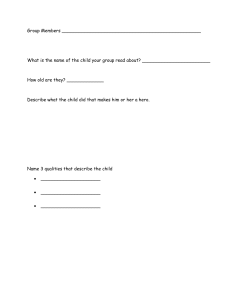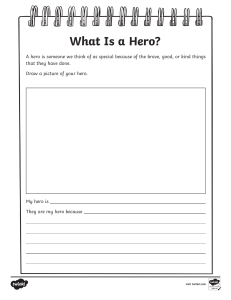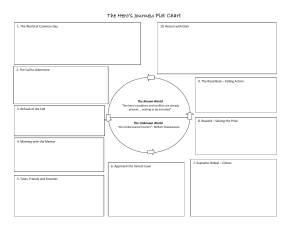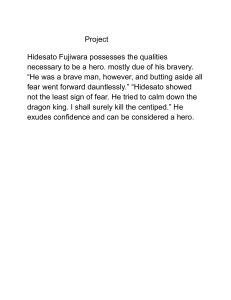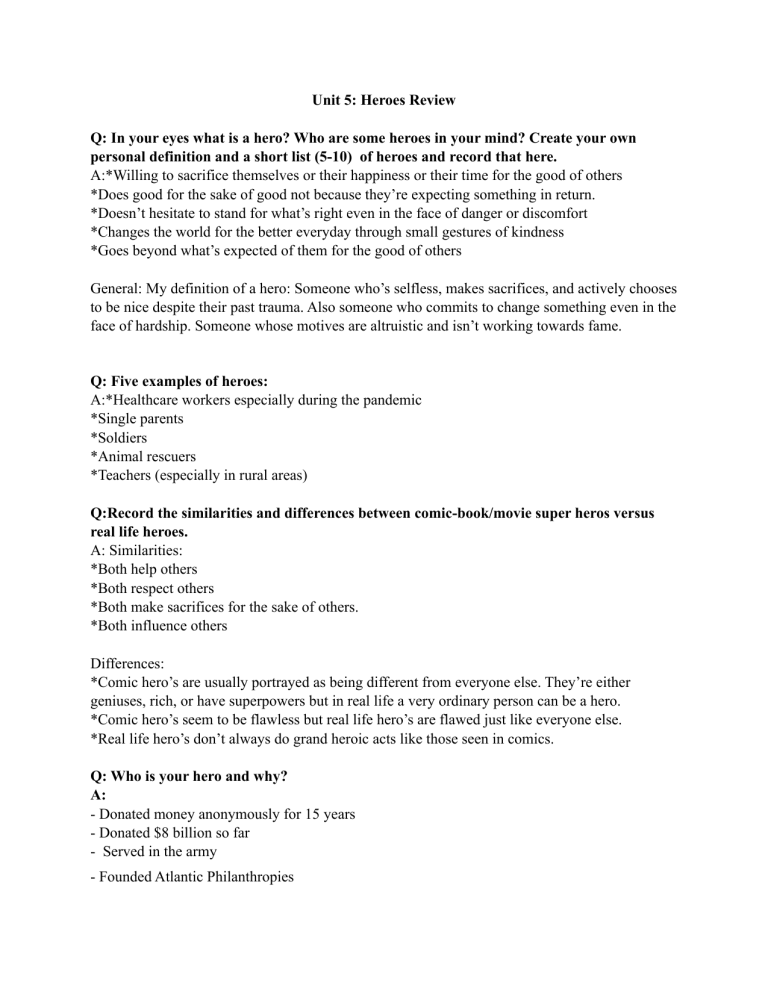
Unit 5: Heroes Review Q: In your eyes what is a hero? Who are some heroes in your mind? Create your own personal definition and a short list (5-10) of heroes and record that here. A:*Willing to sacrifice themselves or their happiness or their time for the good of others *Does good for the sake of good not because they’re expecting something in return. *Doesn’t hesitate to stand for what’s right even in the face of danger or discomfort *Changes the world for the better everyday through small gestures of kindness *Goes beyond what’s expected of them for the good of others General: My definition of a hero: Someone who’s selfless, makes sacrifices, and actively chooses to be nice despite their past trauma. Also someone who commits to change something even in the face of hardship. Someone whose motives are altruistic and isn’t working towards fame. Q: Five examples of heroes: A:*Healthcare workers especially during the pandemic *Single parents *Soldiers *Animal rescuers *Teachers (especially in rural areas) Q:Record the similarities and differences between comic-book/movie super heros versus real life heroes. A: Similarities: *Both help others *Both respect others *Both make sacrifices for the sake of others. *Both influence others Differences: *Comic hero’s are usually portrayed as being different from everyone else. They’re either geniuses, rich, or have superpowers but in real life a very ordinary person can be a hero. *Comic hero’s seem to be flawless but real life hero’s are flawed just like everyone else. *Real life hero’s don’t always do grand heroic acts like those seen in comics. Q: Who is your hero and why? A: - Donated money anonymously for 15 years - Donated $8 billion so far - Served in the army - Founded Atlantic Philanthropies -Inventor of duty free shopping -Funds higher education Q: Summarize the steps of a hero’s journey A: The ordinary world: Intro to the story where everything seems normal. (Hero may be seen as different) Call to adventure: transition from the normal life to new world. Hero is scared/hesitant. This transition is may be caused by mistake or a discovery. New world (setting of most of the story) is very different from old world. Refusal of quest: Hero has to make a decision to continue in the new world and fulfill the request/task or refuse it. If the hero refuses then the story is usually tragic. Campbell says they either end up needing to be saved or being a villain instead. Accepting the call: (Alternative to the refusal) Hero accepts challenge/quest and continues in the new world. Entering the unknown: Story shows how different the new world is and how the hero is very unfamiliar/out of their comfort zone. Also the part that shows monsters, threats, beautiful sights, etc. Supernatural aid: Usually a very wise person/force who comes to aid the hero with their journey either through advice, an object, or a gift. This is crucial for the success of the hero. Talisman: Special/possibly magical object that helps the hero succeed. Allies/Helpers: Is the hero’s sidekick and is crucial for success of mission. Test & supreme ordeal: After many overcominga series of challenges/obstacles the hero arrives at the supreme ordeal. The ultimate challenge/ the purpose of the hero’s journey. This is most likely the climax. Rewards & journey home: Because the hero has succeeded they receive a reward (eg. Kingdom) and return to their normal life. Master of two worlds/restoring the world: Because of the hero’s success they become worthy of a certain position (marriage, kingship, or queenship) Q: What is an archetype? Give your the definition in your own words and at least two examples with reference to movie/book/character. A: An archetype is a character, plot, setting, or color that's universally recognized. It can also be symbols that over thousands of years have become embedded into our subconscious. This is also the reason we have universal dreams (eg.falling from a building, teeth falling). Archetypes in Literture & Film Q:What are archetypes? A: Symbols that over thousands of years have become embedded into our subconscious. Also, reason we can have universal dreams (eg.falling from a building, teeth falling). In film/books archetypes can be characters, plot, setting, color, and symbols. Q: What are the different types of hero’s? A: -Willing hero/ undertake any quest bravely -Unwilling hero/ is doubtful about the quest / eg. Iron man -Epic hero/ admired and brave+noble -Tragic hero/ is flawed and this ends badly for them/ eg. Romeo and Juliet Q: What is an anti-hero? A: This hero is selfish, oppressive, pessimistic, and corrupt. Q: What are the 2 types of anti-hero’s? A: Classic anti-hero/ Jack sparrow Tragic anti-hero/ Darth vador Q:What is an epic hero? A: Someone who’s in an epic poem is a long, serious, poetic narrative about a significant event, often featuring a hero. Eg. Odysseus Q: What’s an epic poem? A: Dramatic poems about a specific trope. Epics often feature the following: 1. A hero who embodies the values of the culture 2. Something vital that depends on the success of the hero’s actions 3.A broad setting (sometimes the entire world) 4. Intervention by supernatural beings Q: What are the different types of mentors? A: The “Wise Old Man/Woman” > Possess wisdom and experience The Comic Mentor >Provides humorous advice The Continuing Mentor> Recurring character such as boss or best friend/ eg. Best friend in romantic comedies. The Fallen Mentor> Have faced a similar crisis; provides warning Quick note: The villain is always the antagonist but the antagonist isn’t always the villain Q: What is the shadow archetype? A: the representation of evil in the story/ isn’t always human but typically includes the villain (eg. Voldemort in HP) Q: Who is The Trickster? A: Is usually funny and foolish but seeks to humiliate others or outwit the hero. They usually lead the plot through their actions. (Eg. Fred and George HP) Q: What is a threshold guardian? A: Normally an obstacle in the hero’s quest which is meant to test their worthiness. (Eg. Three headed dog in HP) Q: What is the Herald archetype? A: Announces the challenge to the hero. (Eg. Hagrid tells HP he’s a wizard). However, the herald isn’t always a person. It can be an event or force. (Eg. The start of war/ drought or famine) Q: What is the shapeshifter archetype? A: Is hard to understand and usually changes very dramatically. They’re meant to create suspense by questioning beliefs/assumptions. (eg. Snape in HP)
